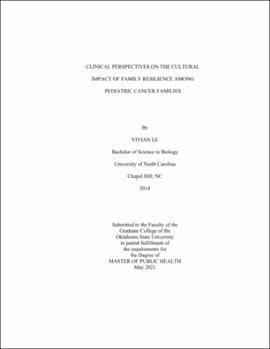| dc.contributor.advisor | Hubach, Randolph | |
| dc.contributor.advisor | Croff, Julie | |
| dc.contributor.author | Le, Vivian | |
| dc.date.accessioned | 2021-09-23T19:51:45Z | |
| dc.date.available | 2021-09-23T19:51:45Z | |
| dc.date.issued | 2021-05 | |
| dc.identifier.uri | https://hdl.handle.net/11244/330850 | |
| dc.description.abstract | Background: Pediatric cancer diagnoses differ from that of adults as their incidence defies environmental influence. Studies show that mortality rates among pediatric cancer patients disproportionately mirror the incidence rates when stratified by race. Although factors such as cancer type and treatment plans change outcomes, biological differences fail to fully explain this imbalance. Thus, the purpose of this study was to explore the role social and environmental factors play in the prognosis of pediatric cancer patients that may explain racial disparities between incidence and mortality rates. | |
| dc.description.abstract | Methods: This study used a qualitative research design with in-depth interviews conducted with clinical staff at a pediatric cancer clinic. A total of 12 interviews were conducted averaging at 37.5 minutes using a semi-structured interview outline. Interviews were transcribed and coded for emerging themes. | |
| dc.description.abstract | Results: Results showed four main themes in the role of culture on pediatric cancer resilience: social support, family composition, compliance, and individual coping. Social support is imperative to a family's resilience through treatment. However, the importance is not the presence of support, but a family's willingness to ask and accept it. Family composition affected resilience by the presence of support within the immediate household and demographics of the parents, especially their educational background, language barriers, and socioeconomic status. Compliance variation correlated with access to resources, age of patient, and understanding of the diagnosis. Individual coping, primarily with parents, was also a critical component, as an innate ability to be adaptive and flexible improved the family experience and influenced patient coping skills. | |
| dc.description.abstract | Conclusions: Implications of this study can inform medical practice in assessing the psychosocial risk factors of a family prior to treatment initiation. This assessment can improve resource allocation, hone in on family strengths, and address any emotional or social weaknesses they may possess. Understanding the complexity of each family structure and their most influential factors of resilience can inform physician conversations with parents. Recognizing the importance of individual parent and patient coping as well as willingness to accept the support that is available can be critical in promoting positive outcomes and outlooks during an arduous, straining, and labile treatment process. | |
| dc.format | application/pdf | |
| dc.language | en_US | |
| dc.rights | Copyright is held by the author who has granted the Oklahoma State University Library the non-exclusive right to share this material in its institutional repository. Contact Digital Library Services at lib-dls@okstate.edu or 405-744-9161 for the permission policy on the use, reproduction or distribution of this material. | |
| dc.title | Clinical perspectives on the cultural impact of family resilience among pediatric cancer families | |
| dc.contributor.committeeMember | Wheeler, Denna | |
| osu.filename | Le_okstate_0664M_17084.pdf | |
| osu.accesstype | Open Access | |
| dc.type.genre | Thesis | |
| dc.type.material | Text | |
| thesis.degree.discipline | Public Health | |
| thesis.degree.grantor | Oklahoma State University | |
